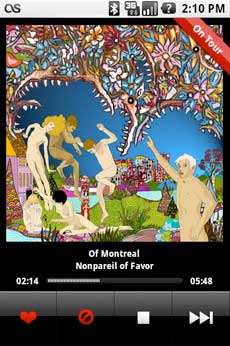The App Store Competition Cometh
There is no denying the popularity of Apple's App store, which offers free and paid applications for the iPhone and iPod touch. By some reports, almost 21,000 apps are currently available for download from the App Store--a very impressive metric, considering that the App Store is only seven months old. But the iPhone is not the only smartphone with a centralized location from where users can download applications for their devices; and the marketplace for smartphone downloads is about to get a lot more crowded.
Right now the only real "competition" to Apple's App Store is the Android Market. Presently, anyone using an Android-based phone can download applications from the Android Market, which first started offering free applications in October of last year. A drawback to Android application developers, however, is the fact that the potential Android Market userbase is fairly small right now, as there is presently only one Android phone available, the T-Mobile G1 (also known as the HTC G1 and the HTC Dream). A second potential Android phone, the Kogan Agora teased us briefly in January, but wound up being indefinitely delayed because it turned out that the phone's display didn't support the screen size and resolution that developers were writing Android apps for.
More Android-based phones are in the works, from the likes of Motorola, Sony Ericsson, and Samsung. In fact, we might even see some of these new Android smartphones make their appearance as soon as next week at the Mobile World Congress trade show in Barcelona, Spain. In the meantime, AdMob reports that the Android OS represents about 1-percent of all online smartphones worldwide, and about 3-percent in the U.S. The most prevalent worldwide smartphone OS is the Symbian OS with 44-percent of the market, and the iPhone OS in the U.S. with 51-percent.
Another drawback Android app developers faced was that the only apps that could be offered on the Android Market were free apps. Developers were informed last October that they would "be able to distribute paid apps in addition to free apps" sometime in Q1 of 2009 and that they would receive "70% of the revenue from each purchase; the remaining amount goes to carriers and billing settlement fees--Google does not take a percentage." In a blog post that went up earlier today, however, it was finally officially revealed that the "Android Market is now accepting priced applications from US and UK developers;" and that "initially, priced applications will be available to end users in the US starting mid next week." Additional countries will be added in the coming months.
But in the coming days, weeks, and months we're also going to see more app stores come online for additional smartphone platforms. Reuters reports that Nokia will officially launch an app store for its Symbian OS-based smartphones at Mobile World Congress on Monday. Microsoft is also getting in the game for smartphones that run the Windows Mobile OS, according to the Wall Street Journal. As Microsoft CEO, Steve Ballmer will be delivering the keynote speech at Mobile World Congress next week, he will likely provide more info on Microsoft's endeavors. Even Palm already has its own app store, which will likely see a lot more advanced and innovative applications available once the Palm Pre is shipping.
It's doubtful the Apple is quaking in its boots, but there is little doubt that the iPhone is about to see a lot more competition from other smartphone platforms.
Right now the only real "competition" to Apple's App Store is the Android Market. Presently, anyone using an Android-based phone can download applications from the Android Market, which first started offering free applications in October of last year. A drawback to Android application developers, however, is the fact that the potential Android Market userbase is fairly small right now, as there is presently only one Android phone available, the T-Mobile G1 (also known as the HTC G1 and the HTC Dream). A second potential Android phone, the Kogan Agora teased us briefly in January, but wound up being indefinitely delayed because it turned out that the phone's display didn't support the screen size and resolution that developers were writing Android apps for.
 |
| Last.fm Android App |
Another drawback Android app developers faced was that the only apps that could be offered on the Android Market were free apps. Developers were informed last October that they would "be able to distribute paid apps in addition to free apps" sometime in Q1 of 2009 and that they would receive "70% of the revenue from each purchase; the remaining amount goes to carriers and billing settlement fees--Google does not take a percentage." In a blog post that went up earlier today, however, it was finally officially revealed that the "Android Market is now accepting priced applications from US and UK developers;" and that "initially, priced applications will be available to end users in the US starting mid next week." Additional countries will be added in the coming months.
But in the coming days, weeks, and months we're also going to see more app stores come online for additional smartphone platforms. Reuters reports that Nokia will officially launch an app store for its Symbian OS-based smartphones at Mobile World Congress on Monday. Microsoft is also getting in the game for smartphones that run the Windows Mobile OS, according to the Wall Street Journal. As Microsoft CEO, Steve Ballmer will be delivering the keynote speech at Mobile World Congress next week, he will likely provide more info on Microsoft's endeavors. Even Palm already has its own app store, which will likely see a lot more advanced and innovative applications available once the Palm Pre is shipping.
It's doubtful the Apple is quaking in its boots, but there is little doubt that the iPhone is about to see a lot more competition from other smartphone platforms.

